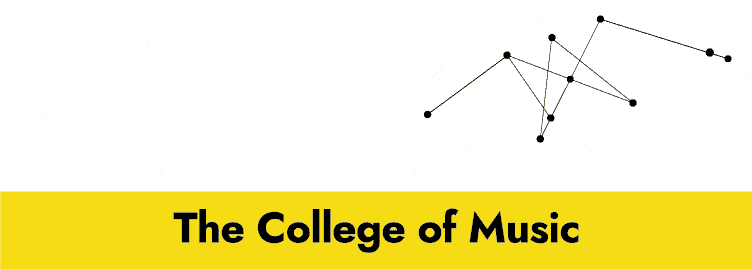JOIN US SEPTEMBER 2024 - APPLY TODAY OR BOOK YOUR PLACE ON ONE OF OUR OPEN DAYS IN BRIGHTON OR SHEFFIELD
JOIN US SEPTEMBER 2024 - APPLY TODAY OR BOOK YOUR PLACE ON ONE OF OUR OPEN DAYS IN BRIGHTON OR SHEFFIELD

Whether you’re an artist trying to make a career in music or someone who wants to step into an alternative role within the music business, having both short-term and long-term goals will help you have a better chance of success. It’ll also prevent you and your business from becoming obsolete. Success is not always measured by profitability, it can also be measured by opportunities and how strong your network is, and beginning with the latter is arguably more crucial than the former to get ahead in the game.
The music industry is currently facing unprecedented times, so it’s important to remain astute and reactive to rapidly changing circumstances. Even without a worldwide pandemic, the music industry is an ever-changing and ever-evolving beast, there to trick you and lure you into a false sense of security before the next landscape change. I’m here to provide a few pointers on how independent artists can future-proof their music career, capitalise on alternative revenue streams and be able to stand resilient in the face of unforeseen adversity.
When we talk about future-proofing, we talk about creating something that is designed to be sustainable or easily adapted in terms of maintaining success. This involves planning ahead, much like I described in my former blog “Top tips on how to self-manage your band”. Planning ahead in this case can involve education, networking, building a name for yourself, having transferable skills, locking in future activities and always being two steps ahead.
Times like these can either make or break an artist, and it’s important to distinguish the differences between artists who have the infrastructure to withstand having their revenue streams limited vs those who don’t.
Planning will always be an integral part of any band’s success, and as far as business models go, it’s important to look to the future and to set SMART Goals [Specific, Measurable, Achievable, Realistic and Time-bound]. Having these will really allow you to have something to work towards but also something to look back on in years to come. This way you can assess whether or not you carried out everything you said you would.
An example of a SMART goal can be to play twice as many shows in 2022 than you will in 2021 (I was going to say 2020 but the joke wrote itself). That is already specific and measurable. It is achievable if you book the shows in advance and it’s a realistic goal if you have a new album cycle that creates demand and opportunity for a busier touring schedule.
A lot of established artists may have a 3-5 year plan based around their current and future album cycles, international touring plans, promotional activities etc. When looking at your own plans you should at least dissect your timeline to one that is relevant for you. For an independent artist I would recommend a 1-2 year business plan mapping out both controllable and possible uncontrollable factors (this is a popular marketing term and can be applied to all business models). A controllable factor for instance is when you choose to release your album, and at what price, and when you choose to book a run of tour dates to promote the album. An uncontrollable factor is Covid-19 decimating the economy and shutting down the live industry, meaning that fans may no longer have money to support you for the time being, and your accompanying tour dates being cancelled as a result. That hurt to write.
In order to prepare yourself for the future it’s crucial to spend some time focusing on the development of your profile, your reputation, and your audience. Over time, your network, those loyal fans, those business cards you picked up at gigs, conferences and festivals will turn themselves into opportunities. Those opportunities will then transform into a revenue stream and the more you have, the more options you have to explore or develop when things don’t go to plan and certain revenue streams (such as live gigs) have been cut off.
An example of how your network can help you generate profitable opportunities is by having good relations with a label who can cut you a deal with a good advance and further your reach, or having a good rapport with a publisher who can help land you sync opportunities. Other examples include knowing an agent who can get you a tour with a good fee or you may know a good manufacturing company who produces high quality merch at a good price so you can sell shirts with a bigger profit margin. The list goes on.
It might seem obvious, but having a strong set up in terms of social media, e-commerce and platforms for audience growth is imperative in the current landscape. Direct to consumer (D2C) in terms of music, merch and ticket sales is part of the modern evolution of the music business and should be an important part of your business model. Knowledge is power, and if you can identify where your fans are, how many of those are actively invested in your music (those who buy gig tickets, music, merch) compared to those who are passive fans (maybe they stream your music and like the odd Facebook post) then you are in a position of power.
The goal however, is always to turn those passive consumers into active ones.
Here is my check list for a future-proof set up so that you can not only maintain a fanbase, but further it during periods of no live activity and still maintain an online presence.
Covid-19 has seen a complete shutdown of the live music industry, and everyone from venue staff, bookers, promoters, managers, tour bus companies, catering companies and more have seen a complete restriction on what, for some of them, is their primary source of income. Bigger artists who pursue music as their full time profession may be a lot more dependent on live income than a developing artist who is establishing themselves in their local scene. No matter the size of the artist, we’re lucky to live in a world where opportunities can be created with the use of modern technology to see them through these times.
Musicians are currently utilising the power of social media and various other platforms such as Twitch, Beatport and Zoom to accommodate live streams, live Q&As and connect with fans during a time when they can’t tour. Now it’s time to bring the fans to YOU. It is important to be innovative and to bring the live show experience to fans in the comfort of their offices and living rooms. By having good quality audio, video and of course a mind-blowing performance (be it acoustic, full band, or just straight up acapella), now is your time to shine and capitalise on fans eager for live music.
If you have a strong fan base you may be able to warrant hosting a ticketed event, and many bands have set up concerts with streaming partners such as Veeps. However if you’re doing this more for exposure points than looking to generate money, you can host a live stream on Facebook, Instagram, Twitch etc. and maybe have a “Tip Jar” and put your PayPal address in the stream comments or description. You can also direct fans to your merch store during the stream if they wish to support you.
If some fans are unable to watch the live stream, you may keep it available for a limited time on socials as well so fans can watch again or share it with their friends. Alternatively, you can record the set and upload it to YouTube after. Lots of possibilities and different methods work for different artists and how they prefer to connect with their fans.
Over the years, accessibility and visibility of music has increased, whereas the overall ‘value’ of music has decreased for the average consumer. So let’s talk about the super fan.
Crowdfunding models have become popular in recent years and help acts to raise money to pay for a new album where they may be lacking in advances from a label, for example. However, if we move up a level from a one off payment structure, we can now look at bands who can ask their fans for repeat payments to support their activities.
Reserved for bands who have a very invested and dedicated following, a subscription model (even if only temporary) can be an interesting way to generate regular income for an artist. Musicians can utilise this platform to connect directly with their fans, offer exclusive pieces of content and opportunities other fans without a subscription cannot access. I think this model will become more popular in the future and a case study I like to refer to when talking about the Patreon model is a band called Ne Obliviscaris, who spoke with Forbes about the innovative model and how they make it work for them.
As you can see, the band has a few tiers in terms of how much you can pay per month. Patrons are given priority access to music, shows, and whatever else an artist is able to offer. This model doesn’t work for everyone, as some artists like to remain elusive or have an air of mystery about them. It means artists need to plan ahead and deliver a constant stream of content, products, opportunities and experiences on a regular basis to provide value for money, otherwise they may lose subscribers. Whether or not it is a long term solution for artists to acquire a regular ‘wage’ to help them fulfill a full time career as a musician is questionable, but it’s great to see the commitment from fans to the acts who do make it work.
In summary, there are a lot of things an independent artist can do to keep momentum up when confronted with such an uncertain future within the music industry. Future-proofing your career can put you in a better position to keep business and activities going when the world presents its challenges. When you’re ready to hit the road again, having that infrastructure passively working away in the background collecting data will allow you to see what growth you’ve been able to achieve and how many more new fans you may be able to reach when you are finally ready for that world tour!
It’s likely that with a lot of international travel bans and restrictions on large gatherings, independent music will become a more focal part of society moving forward and this is a very positive outlook for the developing artist and those just starting out a career in the music business.
Good luck and here’s to a successful future.

- ‘Water bear’ is the common name for a Tardigrade.
- Tardigrades are micro creatures, found everywhere on earth.
- They are the most resilient creatures known.
- They can survive and adapt to their surroundings, even in outer space.
- Their resilience and ability to adapt and survive inspires us in everything we do. We love them.


WaterBear Education Ltd, Hanover House,
118 Queens Road, Brighton BN1 3XG, UK Map
Email: [email protected]
Tel: +44 (0) 1273 726230
WaterBear Sheffield, Unit 4, Gatecrasher,
49 Eyre Lane, Sheffield S1 4RB, UK
Email: [email protected]
Tel: +44 (0) 1143 992720

WaterBear Education Ltd, Hanover House,
118 Queens Road, Brighton BN1 3XG, UK Map
Email: [email protected]
Tel: +44 (0) 1273 726230
WaterBear Sheffield, Unit 4, Gatecrasher,
49 Eyre Lane, Sheffield S1 4RB, UK
Email: [email protected]
Tel: +44 (0) 1143 992720
- ‘Water bear’ is the common name for a Tardigrade.
- Tardigrades are micro creatures, found everywhere on earth.
- They are the most resilient creatures known.
- They can survive and adapt to their surroundings, even in outer space.
- Their resilience and ability to adapt and survive inspires us in everything we do. We love them.
